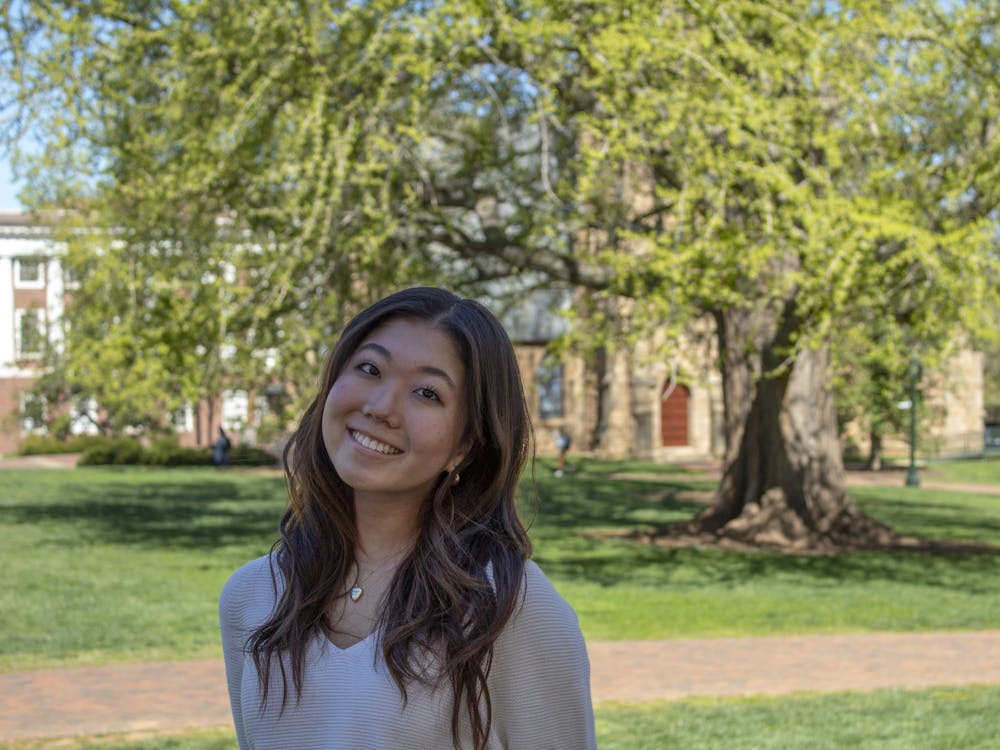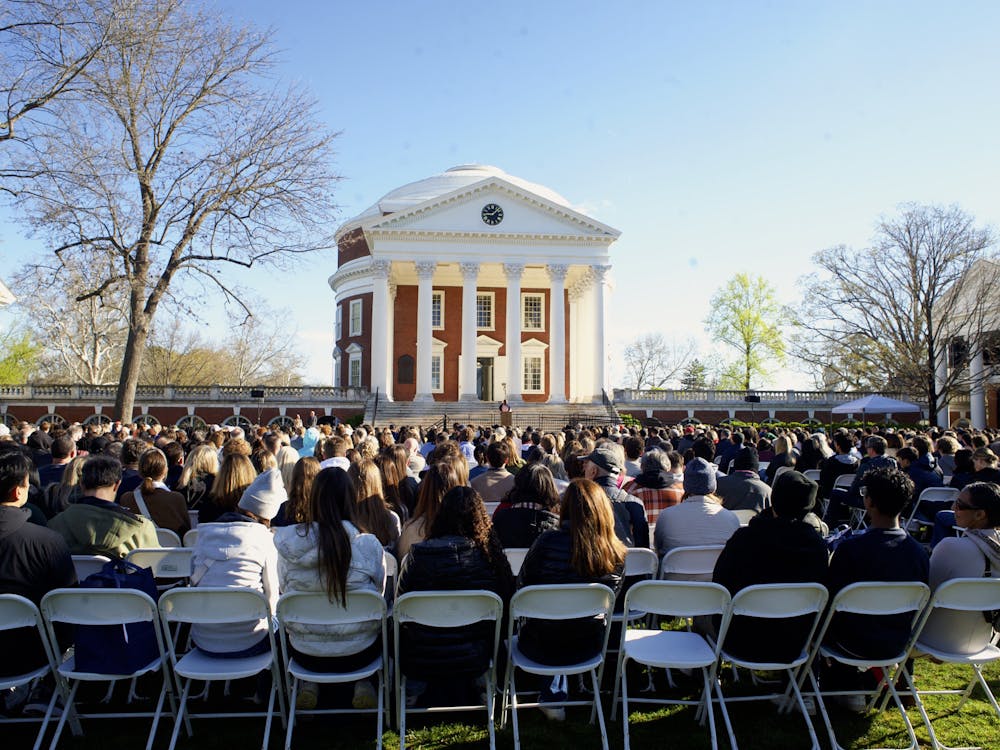The hidden passageways of Culbreth Theater seemed deserted late last Wednesday night. The seemingly interminable corridors led to dressing rooms, classrooms and the stages themselves. A stroll through the scene shop revealed a room obscured by the plethora of currently unemployed props.
Sounds of laughter seeped through the doors -- the building wasn't as empty as it first appeared. Inside, second-year College student Travis Laughlin was attempting to build a ramp of sand.
"Hm, where did we park the bulldozer?" third-year College student Mark Logsdon asked. "I sure hope this ramp of sand won't collapse under my feet like any other normal type of sand would."
Graduate Arts and Sciences student Martin Sheehan sat off to the side, yellow notepad and pen in hand, taking notes while watching the disgruntled duo argue about their situation.
So what exactly was going on? The unusual scene was comprised of The Whethermen, the University's one and only improvisational comedy troupe.
Laughlin and Logsdon weren't hallucinating -- they were just demonstrating their craft, one which requires quite an imagination. In this case, the location was an oasis.
Time for another skit: Third-year Eric Eyerman and first-year Josh Rachford, both in the College, were up next.
"Come up with a character and a motto and turn around when you've got it," Sheehan directed from the side.
Eyerman turned quickly, arms folded, appearing confident with what he had conjured up. Rachford, a new member of The Whethermen, took more time. The setting for this scene? A junkyard. The two pulled it off effortlessly, almost as if the skit had been scripted.
After performing, they discussed the scene as a group -- what went well and what they could have done differently. Eyerman revealed his "motto" to be that "everything [Rachford] did was great." Quite uncannily, Rachford said his motto was that his ideas were second to everyone else's. This serves as a perfect, albeit unintentional, example of one of the goals of improv comedy: make your scene partner look better than you do.
Yet because this is improv acting, it may seem a little odd to be holding rehearsals. But according to The Whethermen, there are many aspects of improv comedy that are worthy of practice time.
"The more that we practice with each other, the stronger we can build up the trust between each other, and the more we trust each other, the more risks we can take and make it bigger and bolder and better," fourth-year College student Allison Mui said.
Third-year College student Mike Jungman offered an analogy.
"It's just like a sports team," Jungman said. "You don't do exactly what you're going to do at a game at a sports practice -- you just practice honing certain skills. We practice honing certain character building skills, certain acting skills, certain listening skills, working as a team and supporting one another."
The troupe practices basic techniques of good improv acting, such as staying in character, keeping a motive and accepting and building on what the other people in the scene provide. These rehearsals are always fundamental for the group, but for the two new members, these practices are even more important.
"I'm anxious to get more comfortable with the group and not worry about every single thing I say being funny or not," Rachford said.
Laughlin said he found the old members to be doing a good job of helping him and Rachford get accustomed to the troupe.
"They're very supportive, and they laugh, probably even when we're not very funny," he said. "I kind of feel like we're already part of the team, even if we're not up to par with them skill-wise."
Getting used to the art of improv comedy may take some time. Logsdon admitted that it can be frightening at first.
"It's very intimidating because you think that you are just going to blank, like you can't think of things that are funny," he said. "When you train yourself so you're paying attention to everything that's going on in the scene, eventually you will just start reacting automatically."
Once the actor grows accustomed to the art, previously complicated concepts become easier.
"It's not as hard as it looks," Eyerman said. "Improv, just like acting, has a bunch of rules. The rules are extremely flexible and extremely breakable, but there are rules that you need to know before you can break them, so once you learn those, it gets a lot easier."
Scene partners also factor into actors' comfort levels, so it is crucial for the group to form strong friendships. As Sheehan said: "We don't rehearse lines -- we do rehearse dynamics."
Mui, the only female in the group of seven (eight total with one member currently studying abroad), said she enjoys the camaraderie.
"I feel like I have a bunch of homeboys or brothers," she said.
"The goal [for improv comedy] is to make people laugh not because of punch lines, but because of characters," Sheehan said. "So much more satisfaction is derived from people laughing at a character you produce than something that you say because anybody can say something inappropriate and get a laugh, but to create a character that people believe in is more satisfying than any throw-away joke that you can have."
It's hard for many people to believe that these actors can create their material right on the spot, but that's precisely what gives improv comedy its edge.
"The funniest stuff that is said is what just sounds natural -- it's not when you just throw out something crazy like 'purple socks,' or 'funny' words like 'monkey,'" Eyerman said sarcastically.
Despite the fact that it is improv and nothing one does or says is necessarily "wrong," there are usually circumstances in which things could be taken to have different meanings.
"When you're up there just winging it, then you're going to make mistakes and say stupid things, but as long as your partner can pick up on it, it's not a problem," Eyerman said.
While improv comedy may sound a bit overwhelming there are innumerable bonuses to this style of acting, as The Whethermen have discovered.
It is "tremendously rewarding to come off stage after a great show and know that it all came out of you, on the spot, no preparation," Eyerman said. "The best part is leaving the stage after a great scene where everyone was laughing."
Sheehan agreed.
"One of the best feelings is knowing that you can make people laugh," he said.
Mui said she enjoys being recognized around Grounds.
"The best one is when you're walking around Grounds and people look at you and they laugh, but not like 'You have a huge booger hanging out of your nose,' but in the whole, 'Ha ha, I think she's funny' kind of thing," she said. "That's flattering, and I really appreciate that."
Objectives and benefits aside, Mui summed up the whole concept of improv comedy.
"It's just the idea that life is funny," she said. "A lot of the magic of improv is that you are making it up as you go, and so you have that power and ability to create anything. It's an exhilarating experience"




